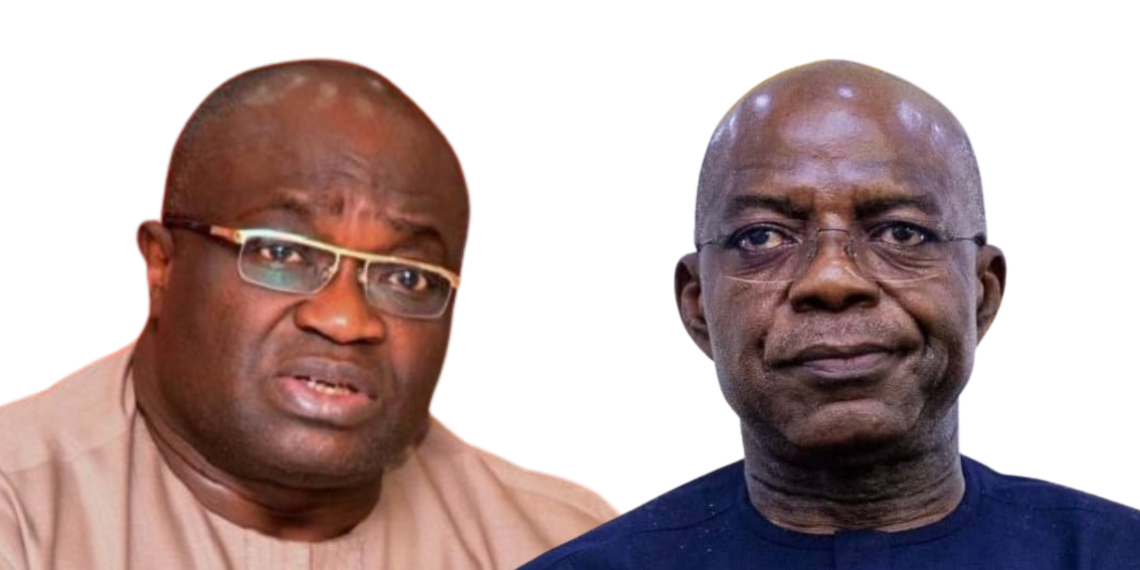...To get all news updates, Join our WhatsApp Group (Click Here)
Also Join our WhatsApp Channel (Click Here)
Governor Alex Otti of Abia State and his predecessor, Okezie Ikpeazu, are currently trading words over the alleged allocation of N10 billion by Mr Ikpeazu-led administration to a non-existent airport project in the state.
Mr Ikpeazu served as a two-term governor of the state under the platform of the Peoples Democratic Party (PDP) between 29 May 2015 and 29 May 2023, when he handed over to Mr Otti.
Mr Otti was elected as governor of the state on 22 March 2023 under the Labour Party ticket.
He defeated the PDP candidate, Okey Ahiwe who was Mr Ikpeazu’s preferred candidate.
How it all started
Mr Otti was at the Johns Hopkins School of Advanced International Studies in the US, where he delivered a lecture on 19 April.
The governor spoke on the topic, “State of Governance and Economic Transition: Meeting the challenges.”
During his lecture, Mr Otti accused Mr Ikpeazu of allocating N10 billion to a non-existent airport project in the state.
He claimed he obtained the information from a report of a forensic audit carried out by a firm contracted by his administration.
A text of the governor’s speech in the US was forwarded to PREMIUM TIMES by his spokesperson, Kazie Uko.
A video clip which showed the governor making the speech has been circulating on various social media platforms.
“Talking about corruption, I had set up a forensic audit as soon as I took over office in Abia, last year (2023). So that there won’t be any argument, I called in one of the top three audit firms in the world, and not too long ago, they turned in their report, and some of the things in their report are frightening,” Mr Otti said.
“So, some N9.3 billion was paid to seven contractors for contracts that were not executed at all up till today. Another N15.9 billion was paid to 63 contractors with no supporting documents anywhere in the state. Another N12 billion was paid to two contractors for contracts that do not exist. Out of this figure N10 billion was on September 25, 2020, paid to some contractor for the construction of the Abia State Airport.
“We have spent time trying to locate the airport and up till now have not been able to locate it. So, as we continue to look for our airport, we have also involved the security agencies to help us search,” the governor stated.
Although Mr Otti did not mention Mr Ikpeazu’s name or his administration in the comment, the former governor was in power within the period the allocation of the funds allegedly took place.
‘Release the audit report’
In his first response in late April, Mr Ikpeazu, through a statement by his spokesperson Onyebuchi Ememanka, denied the allegation describing it as “senseless”.
The former governor consequently challenged Mr Otti to release the audit report which he relied on and also made public details of other projects which were allegedly not executed.
“We hereby throw a public challenge to Alex Otti, Governor of Abia State to make public any documentary evidence or any kind of evidence at all that shows that the sum of N10 billion was paid for an airport.
“When forensic auditors are appointed and when they complete their task, the reasonable thing to do is to make the forensic audit report public and allow the document to speak for itself,” he said.
We gathered that like Mr Ikpeazu, some civil society organisations, such as the Centre for Reform and Public Advocacy, have written to the Abia governor demanding a copy of the forensic audit report and other details of his allegation.
It is unclear, for now, if the governor has released a copy of the forensic audit report to the organisations.
How I spent N10 billion Airport fund – Ikpeazu
In his second response, Mr Ikpeazu, through his former commissioner for Information, John Kalu, explained that the N10 billion originally budgeted for the airport project was rechanneled into other projects following the approval of the then State Executive Council.
“Shortly after we announced Exco’s approval of the airport project, Governor Okezie Ikpeazu received in audience executives of Abia State Traditional Rulers Council then led by HRM Eze Joseph Nwabekee.
“On the 13th of November 2020, Okezie Ikpeazu informed members of the State Executive Council about the details of his meeting with representatives of the traditional rulers in Abia State, who requested that we suspend the airport project and commit the funds earmarked for it to do more roads in the state, as we are surrounded by airports already but need to urgently improve internal roads that would give a further boost to the socio-economic activities of the state.
“The members of the State Executive Council thereafter voted to approve the suspension and request to use the earmarked funds for road projects in the state,” he narrated.
Mr Kalu added that on 17 November 2020, Mr Ikpeazu took to his official X handle (formerly known as Twitter) to inform residents of Abia State that the airport project had been suspended.
The former commissioner listed some of the road projects where the funds were rechannelled, adding that the projects were captured in the state’s approved 2020 budget.
Not the first time
Since inauguration as governor of Abia State, Mr Otti has been making various allegations against Mr Ikpeazu, which appear as discredit to the former governor and his administration.
In June 2023, for instance, Mr Otti accused Mr Ikpeazu of leaving a “humongous” debt burden for the state.
Premium Times.
You can get every of our news as soon as they drop on WhatsApp ...To get all news updates, Join our WhatsApp Group (Click Here)
Also Join our WhatsApp Channel (Click Here)

















